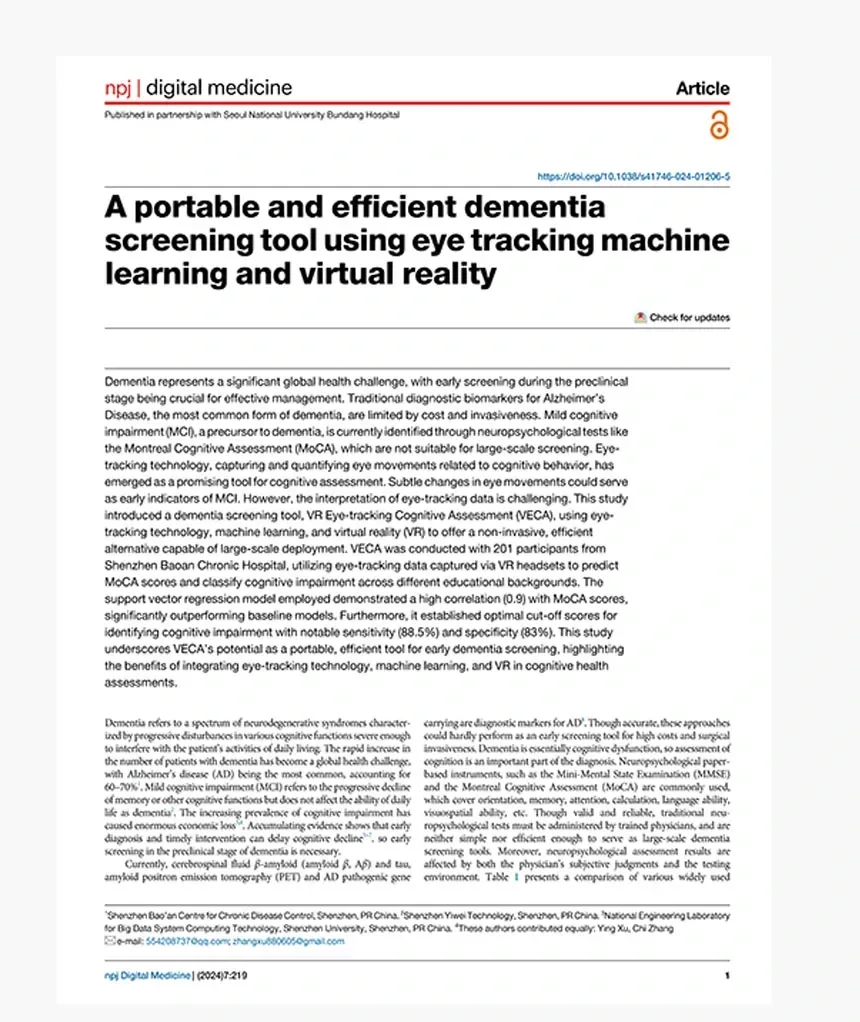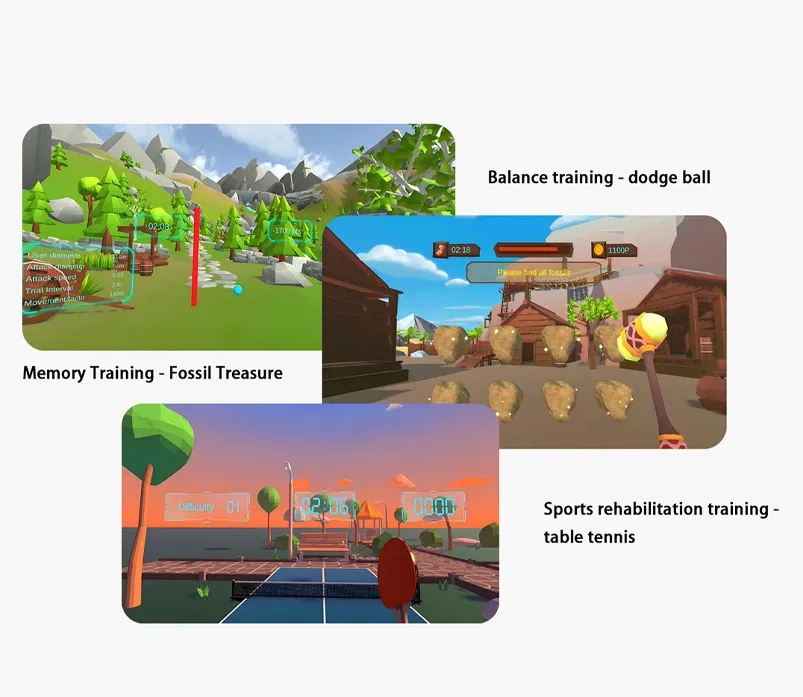
Expanding studies confirms that virtual simulation approach can substantially refine the quality of subjects affected by age-related cognitive diseases. By shifting them to calming backgrounds, VR creates a exceptional pathway for cognitive stimulation, mood control, and social interaction. Multiple investigations have revealed that VR therapy can diminish distress, fear, and gloom in dementia patients individuals while also refining their cognition, engagement, and interaction abilities.
- VR empowers subjects with dementia to recall esteemed pasts through interactive representations.
- Likewise, it can offer a protected and helpful space for group interaction, encouraging a consciousness of affiliation and fitting in.
- Scholars think that VR therapy has the capability to overhaul dementia service by delivering new and novel techniques to manage the difficult obstacles faced by people living with this state.
Electronic Health Solutions for Mental Boosting in Alzheimer's
Emerging electronic treatments are showing promise in the province of memory advancement for clients struggling with Alzheimer's ailment. These programs harness technology to energize brain capacity and hypothetically delay the growth of the health issue. Interactive workouts, personalized evaluation, and thought training are some representations of approaches being explored in this changing territory. While evaluations are happening, digital therapeutics deliver a supportive channel for upgrading the conditions of those managing Alzheimer's disease.Virtual Scenario Navigation in Alzheimer's Treatment
Concerning individuals managing neurodegenerative Alzheimer's type, the continuous decline of cognition and mental competence can considerably reduce their power to socialize with the external setting. This debilitating disease often triggers in loneliness, bewilderment, and a decreased self-concept. Recent improvements in virtual reality technology show a groundbreaking chance to address these challenges by constructing immersive realities that can ignite the brain and strengthen cognitive function.
Digital immersive sceneries created specifically for Alzheimer's individuals can move them in known venues, such as their youthful dwelling or a admired outdoor area, evoking positive memories and mitigating anxiety. Through interactive activities, these virtual realms can also challenge cognitive abilities like mind retention, awareness, and critical thinking.
The advantages of virtual reality in Alzheimer's support are extensive. Early observations have confirmed promising results, with persons exhibiting improvements in cognitive power, mood, and overall quality of life. As this platform evolves, it holds the key to changing the way we approach Alzheimer's disease, offering a new pathway for therapy and motivation.
VR Reminiscence Therapy for Alzheimer's Patients
Reminiscence therapy is a popular technique used to improve cognitive function and affective health in individuals with Alzheimer's disease. This time-honored form of therapy involves stimulating patients to recall past experiences, often through dialogue. However, a cutting-edge approach is emerging: VR-mediated reminiscence therapy.
This immersive system utilizes virtual reality headsets to transport patients in realistic environments that stimulate memories from their past. By immersing in these artificial surroundings, individuals with Alzheimer's can relate with their past in a influential way.
VR's Promise for Dementia Care: Enhancing Memory and Cognition
Virtual reality (VR) is emerging as a hopeful medium in the fight against dementia, presenting modern ways to invigorate memory and cognition. By building immersive platforms, VR can guide individuals with dementia reexperience memories, engage in meaningful activities, and strengthen cognitive capacities. Studies have demonstrated that VR interventions can effect marked improvements in memory recall, attention, and positional awareness. Moreover, VR provides a safe and favorable space for individuals with dementia to communicate, reducing feelings of isolation and apprehension.
- In addition, VR can be configured to individual needs and preferences, granting heightened levels of collaboration.
- Acknowledging the opportunities of VR, supplementary research is needed to fully understand its long-term success in dementia care.
Memory Restoration and Social Reinforcement through VR in Alzheimer's
Augmented simulated realms is emerging as a state-of-the-art platform in the domain of brain degenerative illnesses. By developing involving and participative realities, VR has the prospect to renew memories, develop social interaction, and improve the overall quality of Alzheimer’s disease life for subjects experiencing Alzheimer's. One of the most influential aspects of VR is its ability to relocate users to vintage scenes and occasions from their past. Whether it's a tour of a childhood home or a depiction of a beloved holiday, these virtual explorations can conjure happy memories and consolidate cognitive faculties. Furthermore, VR can assist social interaction by bringing together individuals with others who share similar preferences. This can be particularly useful for people with Alzheimer's who may encounter obstacles with traditional social contact. By providing a safe and compelling virtual space, VR can alleviate feelings of isolation and loneliness, which are common among clients living with Alzheimer's. Overall, VR holds immense capacity for transforming the lives of subjects with Alzheimer's by awakening memories, reinforcing connections, and enhancing their quality of life. As technology persists in evolve, we can expect even more novel applications of VR in the field of dementia care.Gamifying Cognitive Training: Utilizing VR for Alzheimer's Symptom Management
Simulated immersive settings is rapidly emerging as a innovative tool in the realm of cognitive training, particularly for subjects coping with Alzheimer's disease. By immersing patients in interactive and engaging virtual environments, VR-based interventions can advance cognitive functions such as memory, attention, and problem-solving. These games often incorporate elements of storytelling, exploration, and social interaction, making the training process increasingly entertaining. Studies have shown that VR-based cognitive training can lead to considerable improvements in cognitive performance, likely delaying the progression of Alzheimer's symptoms. Moreover, VR provides a safe and controlled environment for patients to practice new skills and strengthen their confidence.
- Game-style methods in VR training can make it significantly captivating and exciting for persons with mental decline.
- VR simulations can offer convincing scenarios that encourage and raise cognitive functions.
- Personalized VR experiences can cater to custom requirements and techniques.
A Simulated Second Chance: Exploring the Benefits of VR Environments for Individuals with Dementia
Alluring digital environments offer a innovative and advantageous avenue for clients facing memory loss. These technologies can reproduce familiar environments, allowing those affected by cognitive decline to recapture cherished memories and promote a sense of solace. By addressing the issues of dementia, VR worlds have the capacity to augment quality of life for both persons and their supporters.
- Research indicate that VR treatments can positively impact cognitive function, mental well-being, and even sensory abilities in individuals with dementia.
- Moreover, VR affords a safe and managed environment for participation, reducing the risk of discomfort.
- Likewise, VR can strengthen social interactions by allowing individuals with dementia to interact in simulated activities with others.
Virtual Reality as a Tool for Early Detection and Intervention in Alzheimer's Disease
Alzheimer's condition presents a elaborate conundrum, often being overlooked in its early stages. Still, virtual reality (VR) is appearing as a innovative tool for precocious diagnosis. Through immersive scenarios, VR can evaluate cognitive function in ways that traditional methods are insufficient to. This power allows for prompt management strategies, potentially stalling disease progression and upgrading the quality of life for persons with Alzheimer's.
- VR cognitive tests measure recall, alertness, and positional skills in safe and regulated spaces.
- Adaptive virtual reality tools motivate subjects to engage in neural stimulation efforts.
- Interactive virtual contexts enable socialization and interaction for Alzheimer's patients.
Connecting Dementia Patients: VR's Role in Communication and Interaction Enhancement
{In the realm of dementia care, innovative technologies are emerging to improve the lives of users with memory loss diseases. Virtual reality (VR) is one such solution that holds immense possibility for narrowing social gaps and boosting communication with dementia clients through VR. By building stimulating VR scenarios, VR can boost cognitive function, reduce behavioral issues, and ultimately improve the overall well-being of people living with dementia.
VR experiences aligned with dementia treatment goals can range from reminiscence therapy sessions that transport participants to cherished memories, to interactive games that promote social interaction and cognitive challenge. Furthermore, VR has the competence to connect individuals with dementia to their loved ones, regardless of physical distance, fostering a sense of belonging.
- VR can encourage in reducing agitation and anxiety by providing a calming and distracting environment.
- Examinations have shown that VR interventions can lead to improvements in cognitive function, mood, and social interaction in individuals with dementia.
- As technology evolves in progress, we can expect even more innovative and {effective|beneficial|helpful|powerful|impactful|successful|productive|efficient
